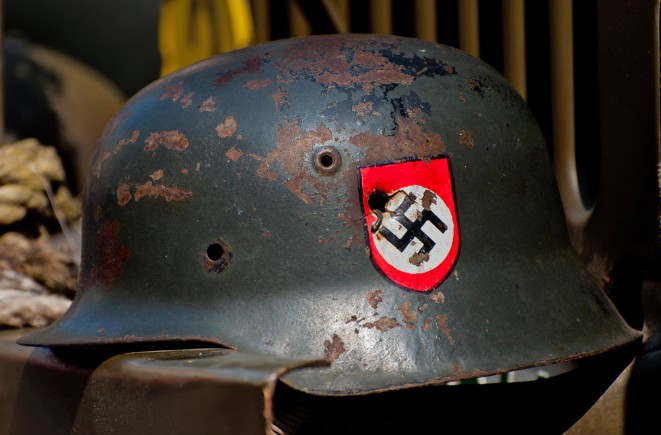The Holocaust
Berthold Beitz: The German Who Rescued Jews from the Holocaust Trains
How a 27-year-old oil manager in Boryslav risked his life, forged documents, and defied the SS to save hundreds from death
- Naama Green
- |Updated

For the Jews crammed by SS men into cattle cars at the Boryslav train station, on their way to the Bełżec extermination camp, there was still one last chance to be saved, thanks to Berthold Beitz.
Beitz, a 27-year-old German who managed the oil refineries in Drohobych, held a secure economic position. In July 1941 he arrived in Boryslav, Eastern Galicia, as part of his work. From the very beginning, he did not hesitate to oppose the killings. He managed to save hundreds of Jews — sometimes at the very last moment, by pulling them off death trains bound for Bełżec. He demanded that SS officers release Jews, claiming they were “essential workers,” and often rescued them with forged work permits he issued.
“An Angel from Heaven Took Us Off the Train”
Many Jewish survivors, and non-Jewish witnesses, later described how Beitz pulled men and women from death trains at the last possible second.
In early August 1942, when rumors spread in Boryslav of an impending SS roundup, Beitz was preparing to leave for a long business trip. His Jewish staff at the Carpathian Oil Company begged him to stay until the situation became clear. For this reason, he was present on August 6, 1942, when the SS began to expel Jews from Boryslav and march them to the train station.
Not long after the deportation began, Beitz learned that one of his Jewish secretaries had been arrested and brought to the station. Without hesitation, he rushed there. Walking along the platform with several SS officers, he began “selecting” Jews for “work” at the refinery, effectively granting them life. For those who had already resigned themselves to death, seeing Beitz arrive sparked a new flame of hope.
Shmuel Wagner, then 19, recalled: “I was just about to climb into a cattle car when Mr. Beitz arrived. He asked me what my profession was. I told him I was a gardener. He sent me to join the group of skilled workers he had already chosen.”
Arthur Biermann, then 14, had once done a small metal job at Beitz’s home. Biermann remembered: “Mr. Beitz was selecting people for the Carpathian Oil Company. They said he only took professionals. Suddenly he noticed me, greeted me, and told the SS officer beside him that he needed me for work. Then he asked me where my mother was. I showed him, and he had her released as well, even though she had no profession at all.”
Moshe Bergmann, an apprentice, also stood at the deportation site that day when Beitz appeared out of nowhere, grabbed his arm, and told the SS officer, “This young man works for me. I can’t do without him.” Bergmann too was spared.
In the second roundup in October 1942, Beitz again came to the station and personally selected 250 men and women, rescuing them from certain death.
The “White House” – A Shelter for the Saved
Beitz did more than just pull Jews from trains. Together with Radecke, a technical director in Boryslav’s municipal administration, he established a refuge known as the “White House.”
Here, he housed skilled Jewish workers and their families, all presented as “essential experts” of the oil industry, when in reality, many of them had no technical training at all. Beitz defended them during SS inspections, insisting that every resident was indispensable.
With the help of a Polish baker, Beitz set up a secret bakery that supplied bread to Jews in the shelter.
 (Photo: shutterstock)
(Photo: shutterstock)“As a German, I Am Ashamed of My Nation’s Crimes”
For many imprisoned Jews, bread was not the only thing Beitz provided. Just as important was the knowledge that someone nearby cared, and shared in their suffering. Survivors recalled how in their darkest hours, Beitz always encouraged them and spoke of a quick end to their torment. They drew strength from his repeated words: “As a German, I am ashamed of the crimes of my people.”
Jewish employees of the Carpathian Oil Company later testified that during deportations, Beitz let them sleep in the company offices to avoid being seized. He risked his own arrest by hiding Jews at his home.
From the earliest days of the oil industry in Boryslav, many Jews had worked in laboratories and administrative roles. During the war, countless others tried to enter the refinery illegally, seeking refuge with relatives inside.
Had Beitz been caught, the punishment was clear: immediate dismissal, deportation to the front, and possibly death. It would have been understandable had he behaved like most of his colleagues, who turned away and did nothing as Jews were murdered. Instead, Beitz risked everything, including his wife and daughter, to save lives.
Why Did He Do It?
When asked years later why he had acted so boldly, Beitz replied with modesty: “Courage is closely tied to ignorance. If I had not been only 28, if I had fully understood the danger, perhaps I would have been more cautious.”
But it was not youth or naiveté alone. Berthold Beitz was one of the very few Germans in Boryslav who found the strength to risk his own life for Jews. He hired untrained men and women as “specialists,” sheltered them in his office and his home, and defied the constant suspicion of Nazi colleagues watching his every move.
His actions testify, beyond doubt, to extraordinary courage.

